Legal Report: Assessing Child Rights, Protection, and Ethical Issues
VerifiedAdded on 2023/06/14
|7
|2124
|249
Report
AI Summary
This report delves into the crucial aspects of child rights, emphasizing their entitlement to specific rights and protection due to their vulnerability. It examines the significance of equal access to education, healthcare, and government support, particularly for children with disabilities. The report discusses ethical and legal issues, including equality, human rights, and healthcare ethics, referencing the Malawi Human Rights Commission's role in addressing rights violations. It analyzes a case study involving the violation of a student's rights to medical emergency, highlighting potential legal remedies and the importance of maintaining dignity. The report also touches upon the World Health Organization's efforts in advancing children's right to health and addressing issues like exploitation, violence, and neglect, advocating for global unity in creating a better world for future generations. Desklib provides access to similar solved assignments and study resources for students.
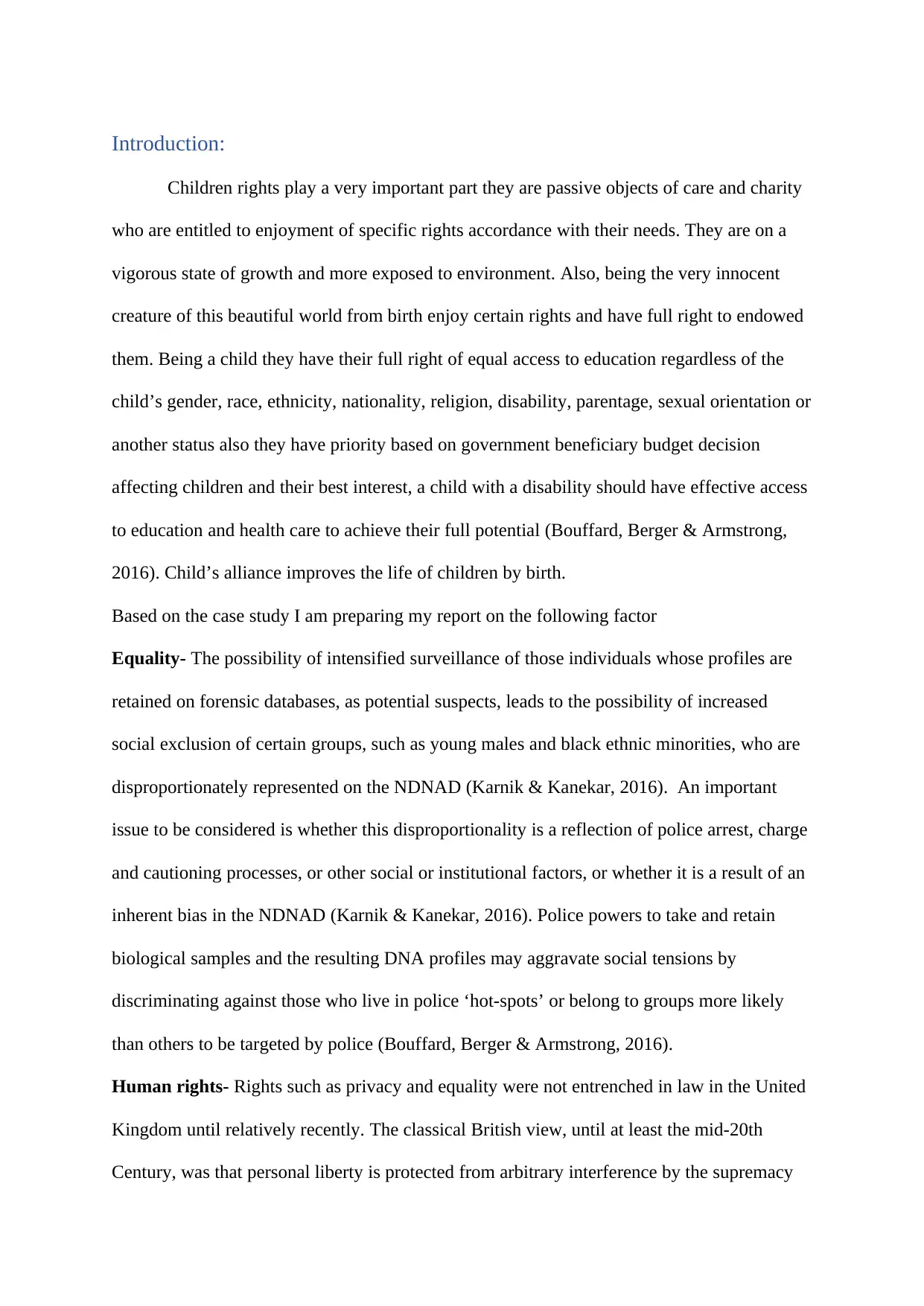
Introduction:
Children rights play a very important part they are passive objects of care and charity
who are entitled to enjoyment of specific rights accordance with their needs. They are on a
vigorous state of growth and more exposed to environment. Also, being the very innocent
creature of this beautiful world from birth enjoy certain rights and have full right to endowed
them. Being a child they have their full right of equal access to education regardless of the
child’s gender, race, ethnicity, nationality, religion, disability, parentage, sexual orientation or
another status also they have priority based on government beneficiary budget decision
affecting children and their best interest, a child with a disability should have effective access
to education and health care to achieve their full potential (Bouffard, Berger & Armstrong,
2016). Child’s alliance improves the life of children by birth.
Based on the case study I am preparing my report on the following factor
Equality- The possibility of intensified surveillance of those individuals whose profiles are
retained on forensic databases, as potential suspects, leads to the possibility of increased
social exclusion of certain groups, such as young males and black ethnic minorities, who are
disproportionately represented on the NDNAD (Karnik & Kanekar, 2016). An important
issue to be considered is whether this disproportionality is a reflection of police arrest, charge
and cautioning processes, or other social or institutional factors, or whether it is a result of an
inherent bias in the NDNAD (Karnik & Kanekar, 2016). Police powers to take and retain
biological samples and the resulting DNA profiles may aggravate social tensions by
discriminating against those who live in police ‘hot-spots’ or belong to groups more likely
than others to be targeted by police (Bouffard, Berger & Armstrong, 2016).
Human rights- Rights such as privacy and equality were not entrenched in law in the United
Kingdom until relatively recently. The classical British view, until at least the mid-20th
Century, was that personal liberty is protected from arbitrary interference by the supremacy
Children rights play a very important part they are passive objects of care and charity
who are entitled to enjoyment of specific rights accordance with their needs. They are on a
vigorous state of growth and more exposed to environment. Also, being the very innocent
creature of this beautiful world from birth enjoy certain rights and have full right to endowed
them. Being a child they have their full right of equal access to education regardless of the
child’s gender, race, ethnicity, nationality, religion, disability, parentage, sexual orientation or
another status also they have priority based on government beneficiary budget decision
affecting children and their best interest, a child with a disability should have effective access
to education and health care to achieve their full potential (Bouffard, Berger & Armstrong,
2016). Child’s alliance improves the life of children by birth.
Based on the case study I am preparing my report on the following factor
Equality- The possibility of intensified surveillance of those individuals whose profiles are
retained on forensic databases, as potential suspects, leads to the possibility of increased
social exclusion of certain groups, such as young males and black ethnic minorities, who are
disproportionately represented on the NDNAD (Karnik & Kanekar, 2016). An important
issue to be considered is whether this disproportionality is a reflection of police arrest, charge
and cautioning processes, or other social or institutional factors, or whether it is a result of an
inherent bias in the NDNAD (Karnik & Kanekar, 2016). Police powers to take and retain
biological samples and the resulting DNA profiles may aggravate social tensions by
discriminating against those who live in police ‘hot-spots’ or belong to groups more likely
than others to be targeted by police (Bouffard, Berger & Armstrong, 2016).
Human rights- Rights such as privacy and equality were not entrenched in law in the United
Kingdom until relatively recently. The classical British view, until at least the mid-20th
Century, was that personal liberty is protected from arbitrary interference by the supremacy
Paraphrase This Document
Need a fresh take? Get an instant paraphrase of this document with our AI Paraphraser
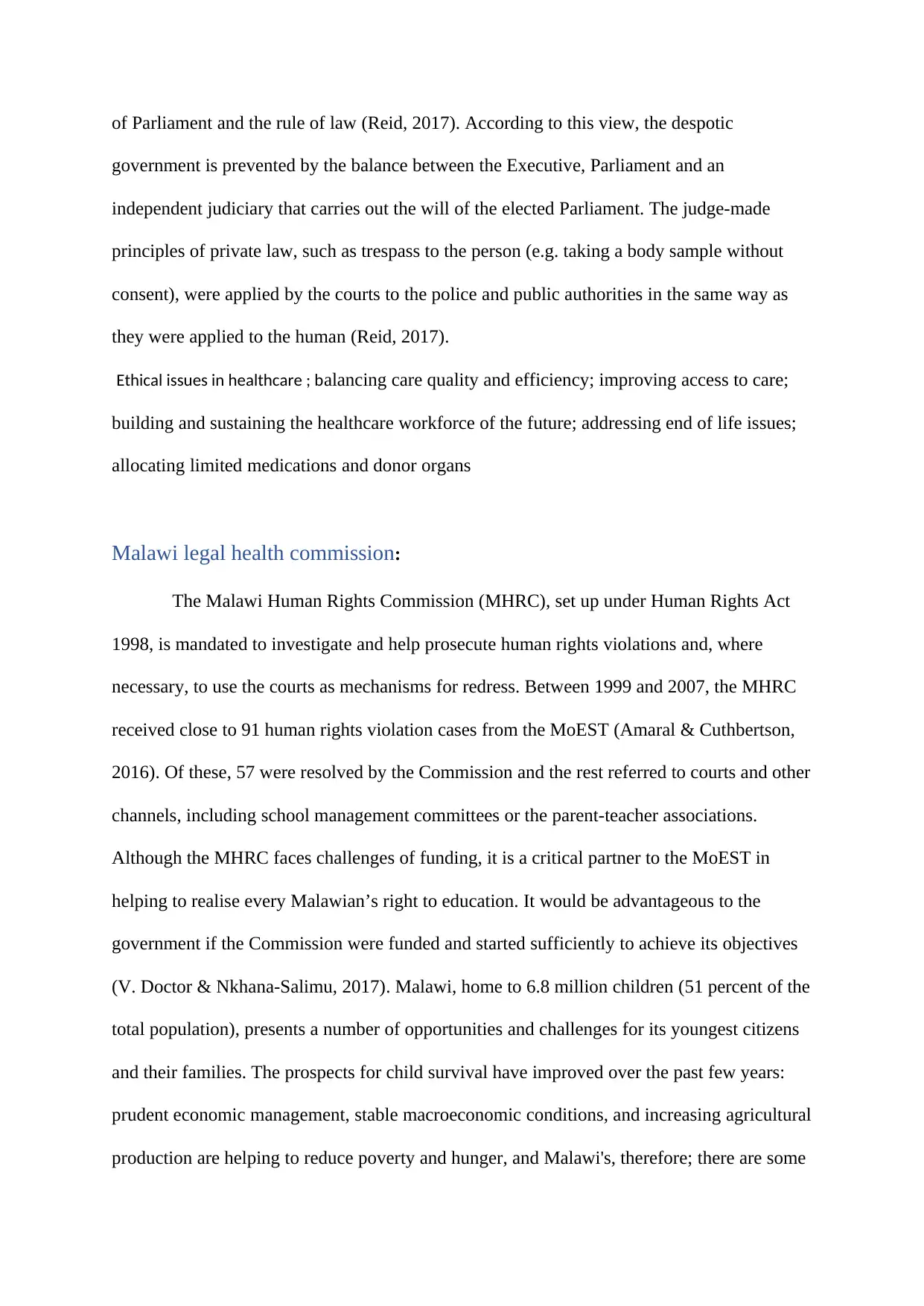
of Parliament and the rule of law (Reid, 2017). According to this view, the despotic
government is prevented by the balance between the Executive, Parliament and an
independent judiciary that carries out the will of the elected Parliament. The judge-made
principles of private law, such as trespass to the person (e.g. taking a body sample without
consent), were applied by the courts to the police and public authorities in the same way as
they were applied to the human (Reid, 2017).
Ethical issues in healthcare ; balancing care quality and efficiency; improving access to care;
building and sustaining the healthcare workforce of the future; addressing end of life issues;
allocating limited medications and donor organs
Malawi legal health commission:
The Malawi Human Rights Commission (MHRC), set up under Human Rights Act
1998, is mandated to investigate and help prosecute human rights violations and, where
necessary, to use the courts as mechanisms for redress. Between 1999 and 2007, the MHRC
received close to 91 human rights violation cases from the MoEST (Amaral & Cuthbertson,
2016). Of these, 57 were resolved by the Commission and the rest referred to courts and other
channels, including school management committees or the parent-teacher associations.
Although the MHRC faces challenges of funding, it is a critical partner to the MoEST in
helping to realise every Malawian’s right to education. It would be advantageous to the
government if the Commission were funded and started sufficiently to achieve its objectives
(V. Doctor & Nkhana-Salimu, 2017). Malawi, home to 6.8 million children (51 percent of the
total population), presents a number of opportunities and challenges for its youngest citizens
and their families. The prospects for child survival have improved over the past few years:
prudent economic management, stable macroeconomic conditions, and increasing agricultural
production are helping to reduce poverty and hunger, and Malawi's, therefore; there are some
government is prevented by the balance between the Executive, Parliament and an
independent judiciary that carries out the will of the elected Parliament. The judge-made
principles of private law, such as trespass to the person (e.g. taking a body sample without
consent), were applied by the courts to the police and public authorities in the same way as
they were applied to the human (Reid, 2017).
Ethical issues in healthcare ; balancing care quality and efficiency; improving access to care;
building and sustaining the healthcare workforce of the future; addressing end of life issues;
allocating limited medications and donor organs
Malawi legal health commission:
The Malawi Human Rights Commission (MHRC), set up under Human Rights Act
1998, is mandated to investigate and help prosecute human rights violations and, where
necessary, to use the courts as mechanisms for redress. Between 1999 and 2007, the MHRC
received close to 91 human rights violation cases from the MoEST (Amaral & Cuthbertson,
2016). Of these, 57 were resolved by the Commission and the rest referred to courts and other
channels, including school management committees or the parent-teacher associations.
Although the MHRC faces challenges of funding, it is a critical partner to the MoEST in
helping to realise every Malawian’s right to education. It would be advantageous to the
government if the Commission were funded and started sufficiently to achieve its objectives
(V. Doctor & Nkhana-Salimu, 2017). Malawi, home to 6.8 million children (51 percent of the
total population), presents a number of opportunities and challenges for its youngest citizens
and their families. The prospects for child survival have improved over the past few years:
prudent economic management, stable macroeconomic conditions, and increasing agricultural
production are helping to reduce poverty and hunger, and Malawi's, therefore; there are some
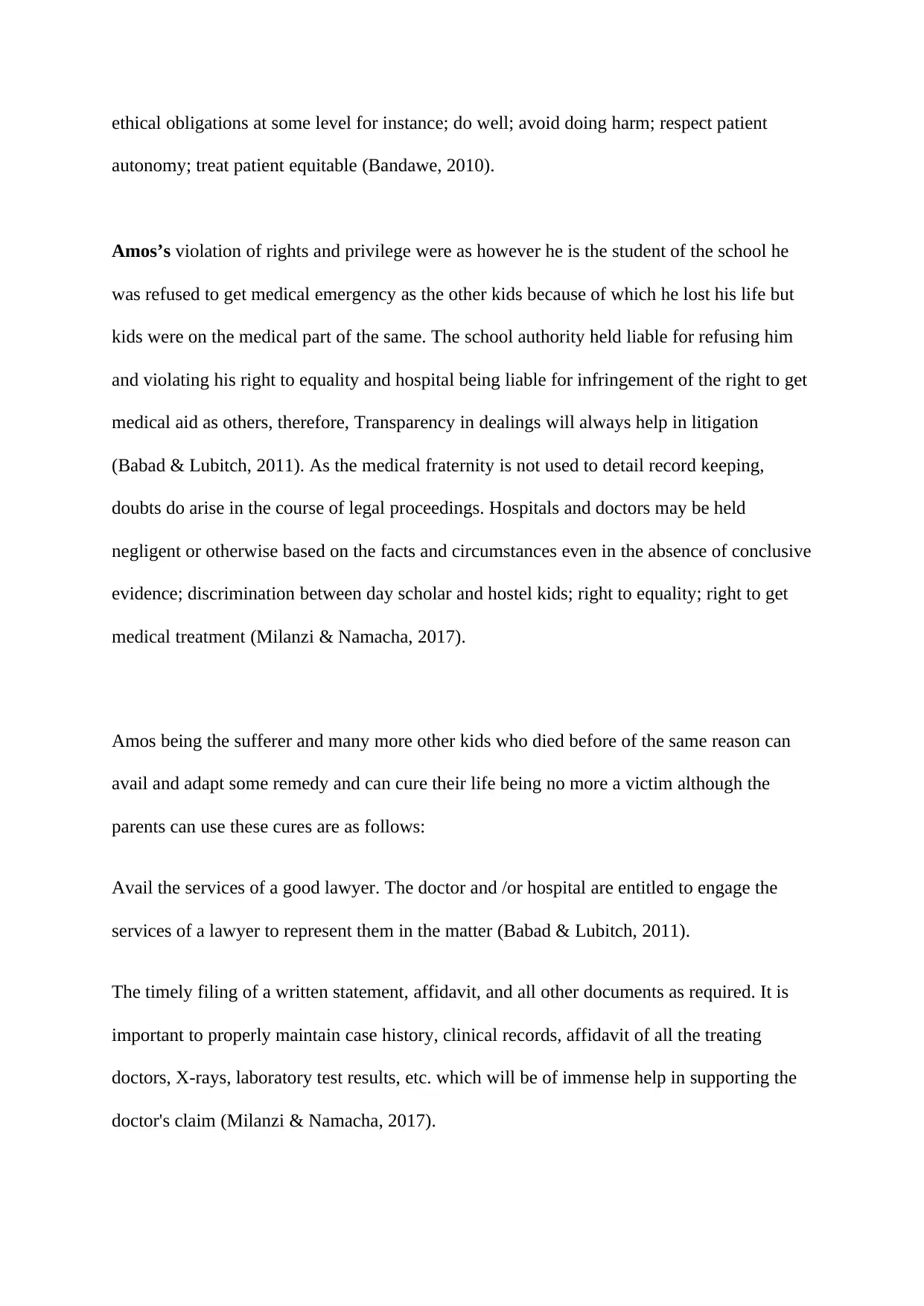
ethical obligations at some level for instance; do well; avoid doing harm; respect patient
autonomy; treat patient equitable (Bandawe, 2010).
Amos’s violation of rights and privilege were as however he is the student of the school he
was refused to get medical emergency as the other kids because of which he lost his life but
kids were on the medical part of the same. The school authority held liable for refusing him
and violating his right to equality and hospital being liable for infringement of the right to get
medical aid as others, therefore, Transparency in dealings will always help in litigation
(Babad & Lubitch, 2011). As the medical fraternity is not used to detail record keeping,
doubts do arise in the course of legal proceedings. Hospitals and doctors may be held
negligent or otherwise based on the facts and circumstances even in the absence of conclusive
evidence; discrimination between day scholar and hostel kids; right to equality; right to get
medical treatment (Milanzi & Namacha, 2017).
Amos being the sufferer and many more other kids who died before of the same reason can
avail and adapt some remedy and can cure their life being no more a victim although the
parents can use these cures are as follows:
Avail the services of a good lawyer. The doctor and /or hospital are entitled to engage the
services of a lawyer to represent them in the matter (Babad & Lubitch, 2011).
The timely filing of a written statement, affidavit, and all other documents as required. It is
important to properly maintain case history, clinical records, affidavit of all the treating
doctors, X-rays, laboratory test results, etc. which will be of immense help in supporting the
doctor's claim (Milanzi & Namacha, 2017).
autonomy; treat patient equitable (Bandawe, 2010).
Amos’s violation of rights and privilege were as however he is the student of the school he
was refused to get medical emergency as the other kids because of which he lost his life but
kids were on the medical part of the same. The school authority held liable for refusing him
and violating his right to equality and hospital being liable for infringement of the right to get
medical aid as others, therefore, Transparency in dealings will always help in litigation
(Babad & Lubitch, 2011). As the medical fraternity is not used to detail record keeping,
doubts do arise in the course of legal proceedings. Hospitals and doctors may be held
negligent or otherwise based on the facts and circumstances even in the absence of conclusive
evidence; discrimination between day scholar and hostel kids; right to equality; right to get
medical treatment (Milanzi & Namacha, 2017).
Amos being the sufferer and many more other kids who died before of the same reason can
avail and adapt some remedy and can cure their life being no more a victim although the
parents can use these cures are as follows:
Avail the services of a good lawyer. The doctor and /or hospital are entitled to engage the
services of a lawyer to represent them in the matter (Babad & Lubitch, 2011).
The timely filing of a written statement, affidavit, and all other documents as required. It is
important to properly maintain case history, clinical records, affidavit of all the treating
doctors, X-rays, laboratory test results, etc. which will be of immense help in supporting the
doctor's claim (Milanzi & Namacha, 2017).
⊘ This is a preview!⊘
Do you want full access?
Subscribe today to unlock all pages.

Trusted by 1+ million students worldwide
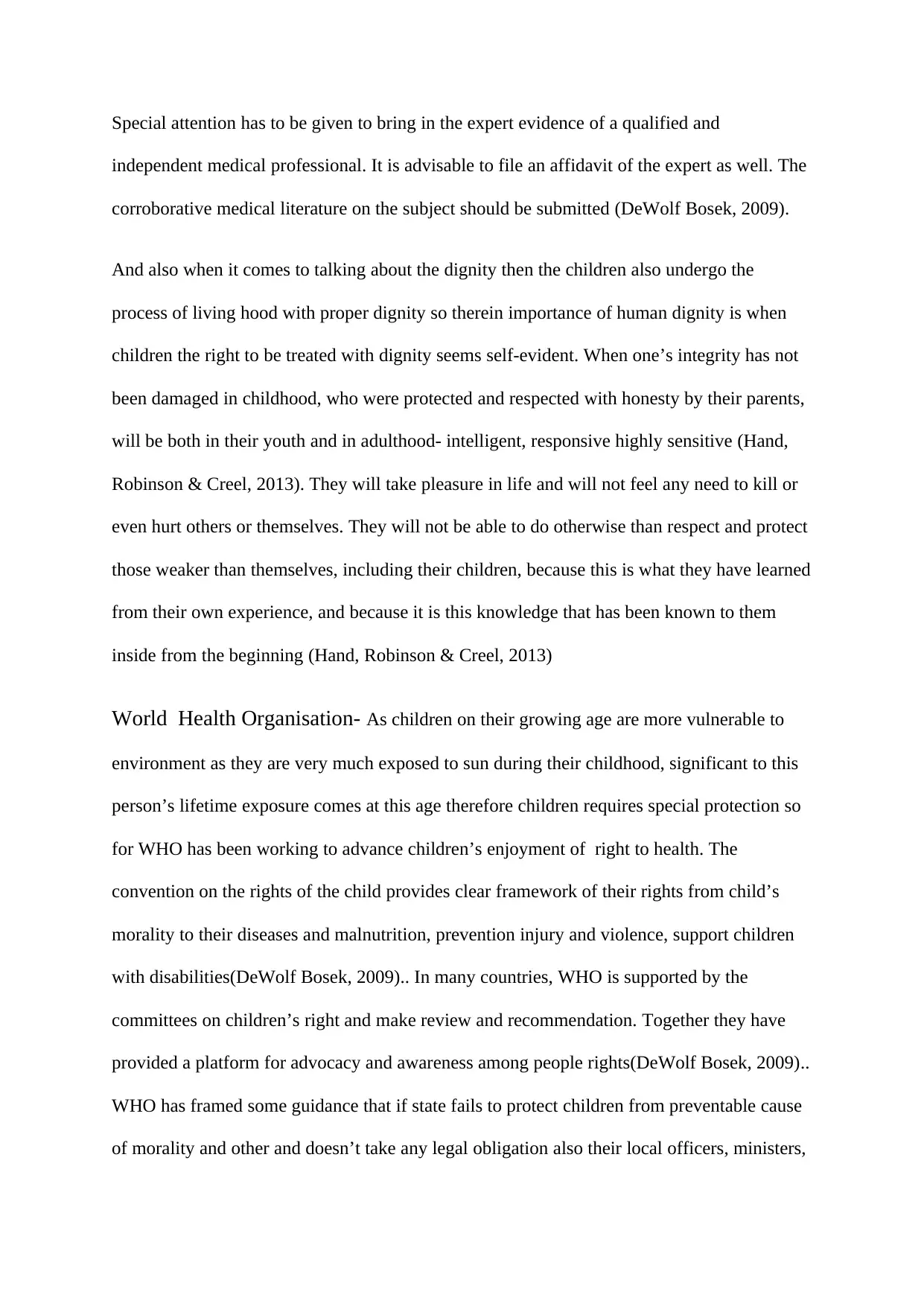
Special attention has to be given to bring in the expert evidence of a qualified and
independent medical professional. It is advisable to file an affidavit of the expert as well. The
corroborative medical literature on the subject should be submitted (DeWolf Bosek, 2009).
And also when it comes to talking about the dignity then the children also undergo the
process of living hood with proper dignity so therein importance of human dignity is when
children the right to be treated with dignity seems self-evident. When one’s integrity has not
been damaged in childhood, who were protected and respected with honesty by their parents,
will be both in their youth and in adulthood- intelligent, responsive highly sensitive (Hand,
Robinson & Creel, 2013). They will take pleasure in life and will not feel any need to kill or
even hurt others or themselves. They will not be able to do otherwise than respect and protect
those weaker than themselves, including their children, because this is what they have learned
from their own experience, and because it is this knowledge that has been known to them
inside from the beginning (Hand, Robinson & Creel, 2013)
World Health Organisation- As children on their growing age are more vulnerable to
environment as they are very much exposed to sun during their childhood, significant to this
person’s lifetime exposure comes at this age therefore children requires special protection so
for WHO has been working to advance children’s enjoyment of right to health. The
convention on the rights of the child provides clear framework of their rights from child’s
morality to their diseases and malnutrition, prevention injury and violence, support children
with disabilities(DeWolf Bosek, 2009).. In many countries, WHO is supported by the
committees on children’s right and make review and recommendation. Together they have
provided a platform for advocacy and awareness among people rights(DeWolf Bosek, 2009)..
WHO has framed some guidance that if state fails to protect children from preventable cause
of morality and other and doesn’t take any legal obligation also their local officers, ministers,
independent medical professional. It is advisable to file an affidavit of the expert as well. The
corroborative medical literature on the subject should be submitted (DeWolf Bosek, 2009).
And also when it comes to talking about the dignity then the children also undergo the
process of living hood with proper dignity so therein importance of human dignity is when
children the right to be treated with dignity seems self-evident. When one’s integrity has not
been damaged in childhood, who were protected and respected with honesty by their parents,
will be both in their youth and in adulthood- intelligent, responsive highly sensitive (Hand,
Robinson & Creel, 2013). They will take pleasure in life and will not feel any need to kill or
even hurt others or themselves. They will not be able to do otherwise than respect and protect
those weaker than themselves, including their children, because this is what they have learned
from their own experience, and because it is this knowledge that has been known to them
inside from the beginning (Hand, Robinson & Creel, 2013)
World Health Organisation- As children on their growing age are more vulnerable to
environment as they are very much exposed to sun during their childhood, significant to this
person’s lifetime exposure comes at this age therefore children requires special protection so
for WHO has been working to advance children’s enjoyment of right to health. The
convention on the rights of the child provides clear framework of their rights from child’s
morality to their diseases and malnutrition, prevention injury and violence, support children
with disabilities(DeWolf Bosek, 2009).. In many countries, WHO is supported by the
committees on children’s right and make review and recommendation. Together they have
provided a platform for advocacy and awareness among people rights(DeWolf Bosek, 2009)..
WHO has framed some guidance that if state fails to protect children from preventable cause
of morality and other and doesn’t take any legal obligation also their local officers, ministers,
Paraphrase This Document
Need a fresh take? Get an instant paraphrase of this document with our AI Paraphraser
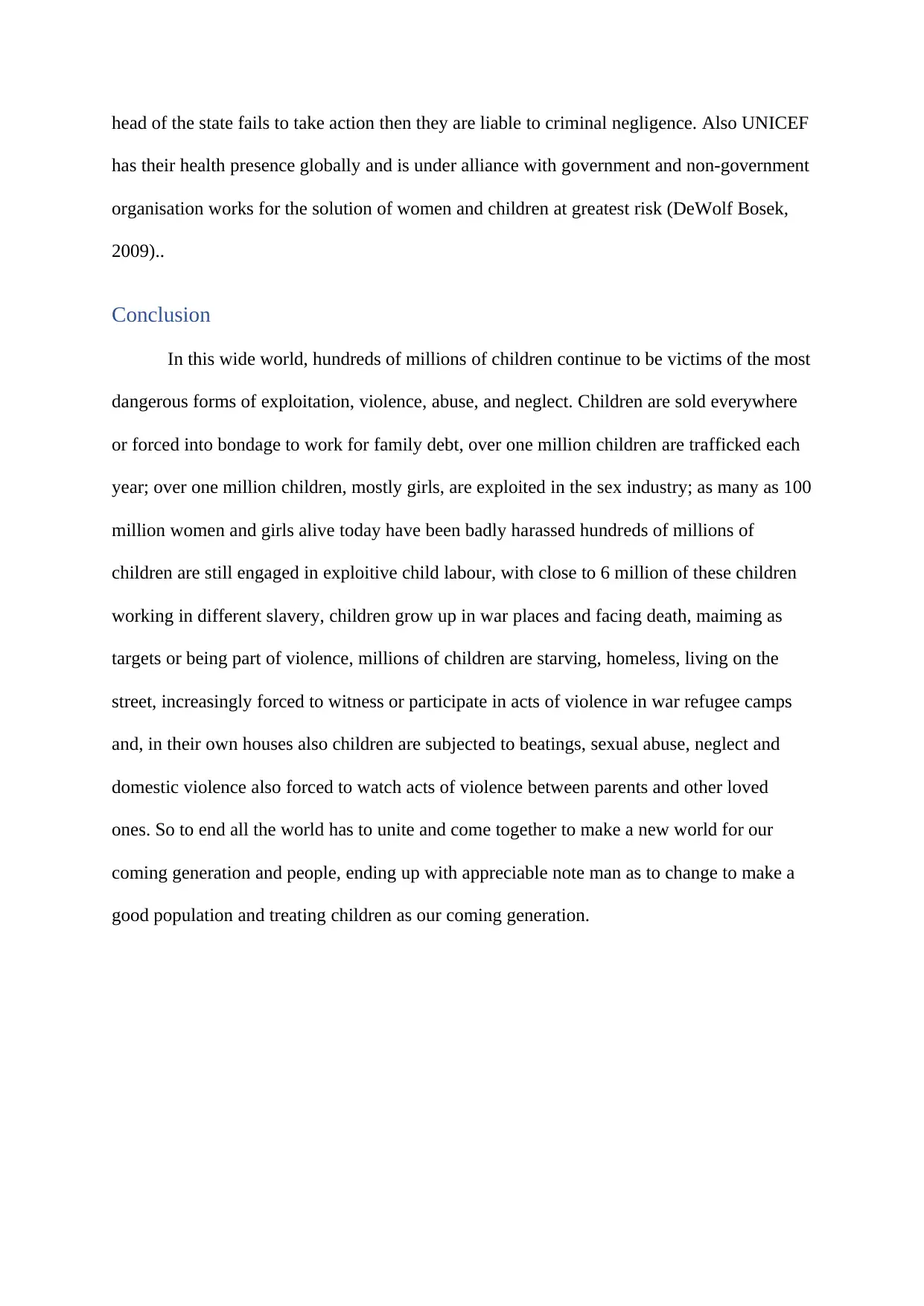
head of the state fails to take action then they are liable to criminal negligence. Also UNICEF
has their health presence globally and is under alliance with government and non-government
organisation works for the solution of women and children at greatest risk (DeWolf Bosek,
2009)..
Conclusion
In this wide world, hundreds of millions of children continue to be victims of the most
dangerous forms of exploitation, violence, abuse, and neglect. Children are sold everywhere
or forced into bondage to work for family debt, over one million children are trafficked each
year; over one million children, mostly girls, are exploited in the sex industry; as many as 100
million women and girls alive today have been badly harassed hundreds of millions of
children are still engaged in exploitive child labour, with close to 6 million of these children
working in different slavery, children grow up in war places and facing death, maiming as
targets or being part of violence, millions of children are starving, homeless, living on the
street, increasingly forced to witness or participate in acts of violence in war refugee camps
and, in their own houses also children are subjected to beatings, sexual abuse, neglect and
domestic violence also forced to watch acts of violence between parents and other loved
ones. So to end all the world has to unite and come together to make a new world for our
coming generation and people, ending up with appreciable note man as to change to make a
good population and treating children as our coming generation.
has their health presence globally and is under alliance with government and non-government
organisation works for the solution of women and children at greatest risk (DeWolf Bosek,
2009)..
Conclusion
In this wide world, hundreds of millions of children continue to be victims of the most
dangerous forms of exploitation, violence, abuse, and neglect. Children are sold everywhere
or forced into bondage to work for family debt, over one million children are trafficked each
year; over one million children, mostly girls, are exploited in the sex industry; as many as 100
million women and girls alive today have been badly harassed hundreds of millions of
children are still engaged in exploitive child labour, with close to 6 million of these children
working in different slavery, children grow up in war places and facing death, maiming as
targets or being part of violence, millions of children are starving, homeless, living on the
street, increasingly forced to witness or participate in acts of violence in war refugee camps
and, in their own houses also children are subjected to beatings, sexual abuse, neglect and
domestic violence also forced to watch acts of violence between parents and other loved
ones. So to end all the world has to unite and come together to make a new world for our
coming generation and people, ending up with appreciable note man as to change to make a
good population and treating children as our coming generation.
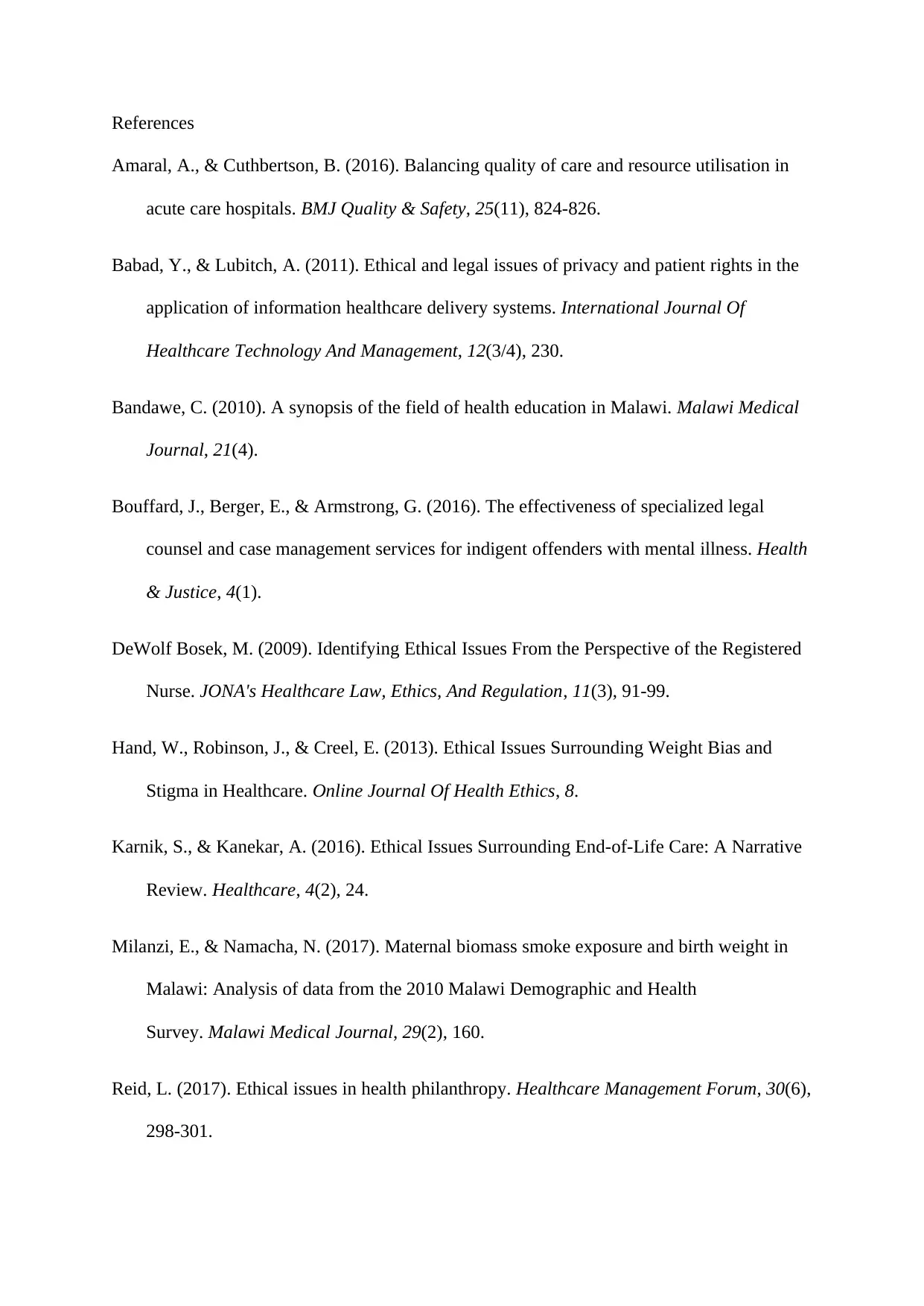
References
Amaral, A., & Cuthbertson, B. (2016). Balancing quality of care and resource utilisation in
acute care hospitals. BMJ Quality & Safety, 25(11), 824-826.
Babad, Y., & Lubitch, A. (2011). Ethical and legal issues of privacy and patient rights in the
application of information healthcare delivery systems. International Journal Of
Healthcare Technology And Management, 12(3/4), 230.
Bandawe, C. (2010). A synopsis of the field of health education in Malawi. Malawi Medical
Journal, 21(4).
Bouffard, J., Berger, E., & Armstrong, G. (2016). The effectiveness of specialized legal
counsel and case management services for indigent offenders with mental illness. Health
& Justice, 4(1).
DeWolf Bosek, M. (2009). Identifying Ethical Issues From the Perspective of the Registered
Nurse. JONA's Healthcare Law, Ethics, And Regulation, 11(3), 91-99.
Hand, W., Robinson, J., & Creel, E. (2013). Ethical Issues Surrounding Weight Bias and
Stigma in Healthcare. Online Journal Of Health Ethics, 8.
Karnik, S., & Kanekar, A. (2016). Ethical Issues Surrounding End-of-Life Care: A Narrative
Review. Healthcare, 4(2), 24.
Milanzi, E., & Namacha, N. (2017). Maternal biomass smoke exposure and birth weight in
Malawi: Analysis of data from the 2010 Malawi Demographic and Health
Survey. Malawi Medical Journal, 29(2), 160.
Reid, L. (2017). Ethical issues in health philanthropy. Healthcare Management Forum, 30(6),
298-301.
Amaral, A., & Cuthbertson, B. (2016). Balancing quality of care and resource utilisation in
acute care hospitals. BMJ Quality & Safety, 25(11), 824-826.
Babad, Y., & Lubitch, A. (2011). Ethical and legal issues of privacy and patient rights in the
application of information healthcare delivery systems. International Journal Of
Healthcare Technology And Management, 12(3/4), 230.
Bandawe, C. (2010). A synopsis of the field of health education in Malawi. Malawi Medical
Journal, 21(4).
Bouffard, J., Berger, E., & Armstrong, G. (2016). The effectiveness of specialized legal
counsel and case management services for indigent offenders with mental illness. Health
& Justice, 4(1).
DeWolf Bosek, M. (2009). Identifying Ethical Issues From the Perspective of the Registered
Nurse. JONA's Healthcare Law, Ethics, And Regulation, 11(3), 91-99.
Hand, W., Robinson, J., & Creel, E. (2013). Ethical Issues Surrounding Weight Bias and
Stigma in Healthcare. Online Journal Of Health Ethics, 8.
Karnik, S., & Kanekar, A. (2016). Ethical Issues Surrounding End-of-Life Care: A Narrative
Review. Healthcare, 4(2), 24.
Milanzi, E., & Namacha, N. (2017). Maternal biomass smoke exposure and birth weight in
Malawi: Analysis of data from the 2010 Malawi Demographic and Health
Survey. Malawi Medical Journal, 29(2), 160.
Reid, L. (2017). Ethical issues in health philanthropy. Healthcare Management Forum, 30(6),
298-301.
⊘ This is a preview!⊘
Do you want full access?
Subscribe today to unlock all pages.

Trusted by 1+ million students worldwide
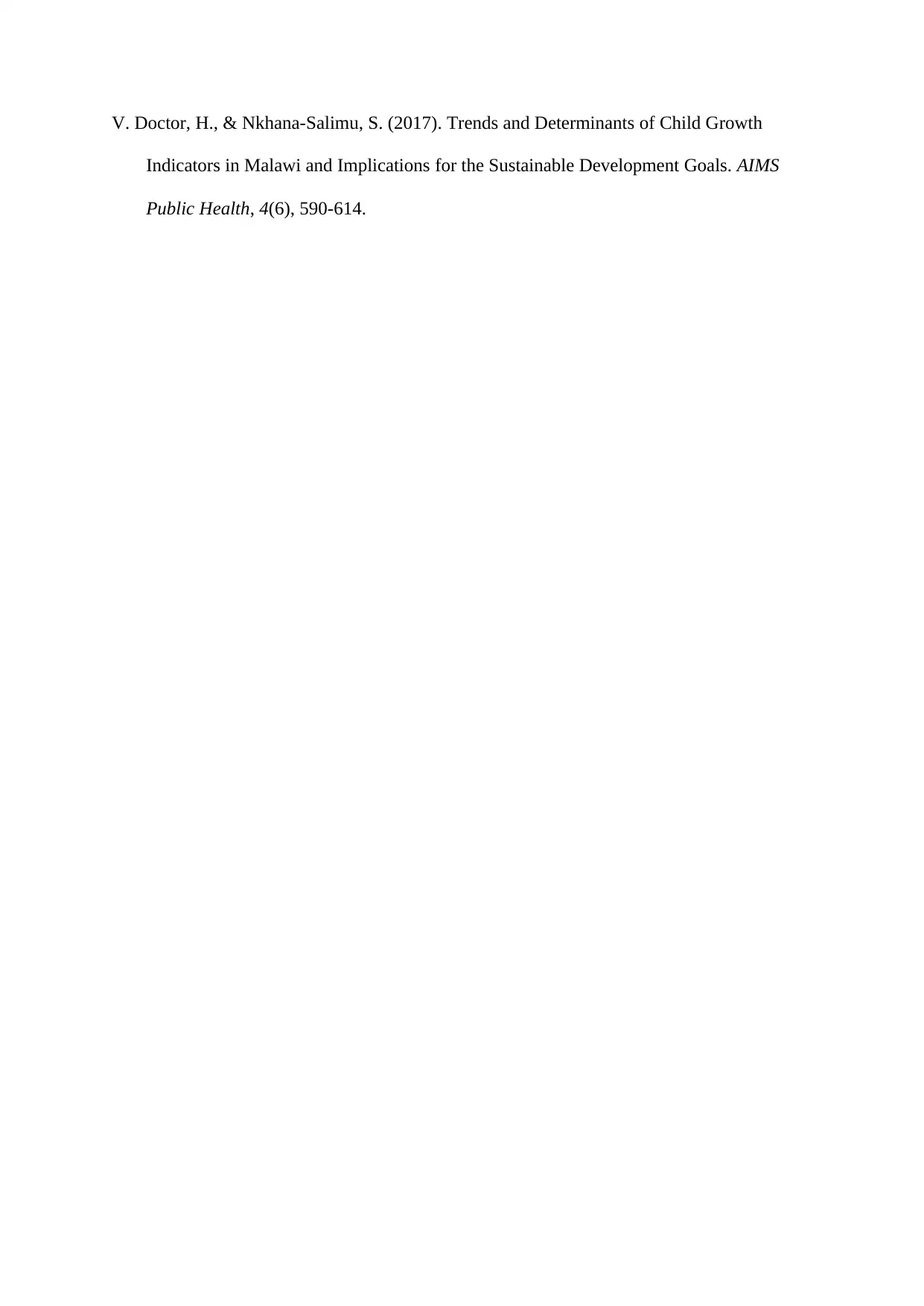
V. Doctor, H., & Nkhana-Salimu, S. (2017). Trends and Determinants of Child Growth
Indicators in Malawi and Implications for the Sustainable Development Goals. AIMS
Public Health, 4(6), 590-614.
Indicators in Malawi and Implications for the Sustainable Development Goals. AIMS
Public Health, 4(6), 590-614.
1 out of 7
Your All-in-One AI-Powered Toolkit for Academic Success.
+13062052269
info@desklib.com
Available 24*7 on WhatsApp / Email
![[object Object]](/_next/static/media/star-bottom.7253800d.svg)
Unlock your academic potential
Copyright © 2020–2026 A2Z Services. All Rights Reserved. Developed and managed by ZUCOL.
